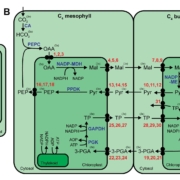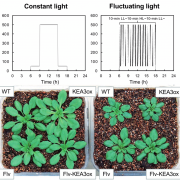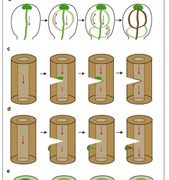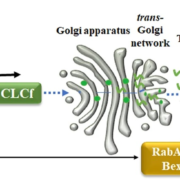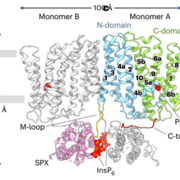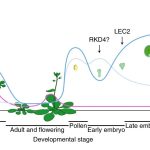ABA-INSENSITIVE1 activates ammonium transporter AMT1 in an ABA dependent manner (Plant Physiol)
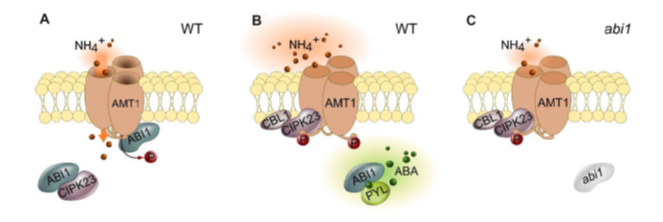 To avoid ammonium toxicity, the ammonium transporters (AMTs) are tightly regulated by phosphorylation-dependent inactivation. The multifunctional kinase CIPK23 inactivates the AMT1s by phosphorylating conserved threonine residues (T460 in AMT1;1 and T472 in AMT1;2). ABA-INSENSITIVE1 (ABI1) and ABI2 are members of clade A Protein Phosphatase 2 C, and core components of ABA signalling. ABI2 is a known regulator of nitrate uptake by its interaction with CIPK23, CBL1, and the dual affinity nitrate transceptor NPF6.3. Here, Ganz et al. report the prominent contribution of ABI1 in the post-translational regulation of AMT1 in an ammonium- and ABA-dependent manner. High levels of ammonium increase root ABA accumulation, possibly by promoting ABA de-glycosylation in the vacuole and endoplasmic reticulum. abi1-2 mutants are defective in ammonium uptake and are thus tolerant to high levels of ammonium. Similar to the abi1-2 mutants, high exogenous ABA supply also suppresses ammonium uptake. Under low ammonium conditions, ABI1 inactivates CIPK23, there by activating AMT1s. At high levels of ammonium, the increase in ABA content and the resultant robust ABA signalling inactivate ABI1, rendering CIPK23 active, which in turn phosphorylates and inactivates AMT1, decreasing ammonium uptake. (Summary by Lekshmy Sathee @lekshmysnair) Plant Physiol. 10.1093/plphys/kiac315
To avoid ammonium toxicity, the ammonium transporters (AMTs) are tightly regulated by phosphorylation-dependent inactivation. The multifunctional kinase CIPK23 inactivates the AMT1s by phosphorylating conserved threonine residues (T460 in AMT1;1 and T472 in AMT1;2). ABA-INSENSITIVE1 (ABI1) and ABI2 are members of clade A Protein Phosphatase 2 C, and core components of ABA signalling. ABI2 is a known regulator of nitrate uptake by its interaction with CIPK23, CBL1, and the dual affinity nitrate transceptor NPF6.3. Here, Ganz et al. report the prominent contribution of ABI1 in the post-translational regulation of AMT1 in an ammonium- and ABA-dependent manner. High levels of ammonium increase root ABA accumulation, possibly by promoting ABA de-glycosylation in the vacuole and endoplasmic reticulum. abi1-2 mutants are defective in ammonium uptake and are thus tolerant to high levels of ammonium. Similar to the abi1-2 mutants, high exogenous ABA supply also suppresses ammonium uptake. Under low ammonium conditions, ABI1 inactivates CIPK23, there by activating AMT1s. At high levels of ammonium, the increase in ABA content and the resultant robust ABA signalling inactivate ABI1, rendering CIPK23 active, which in turn phosphorylates and inactivates AMT1, decreasing ammonium uptake. (Summary by Lekshmy Sathee @lekshmysnair) Plant Physiol. 10.1093/plphys/kiac315


